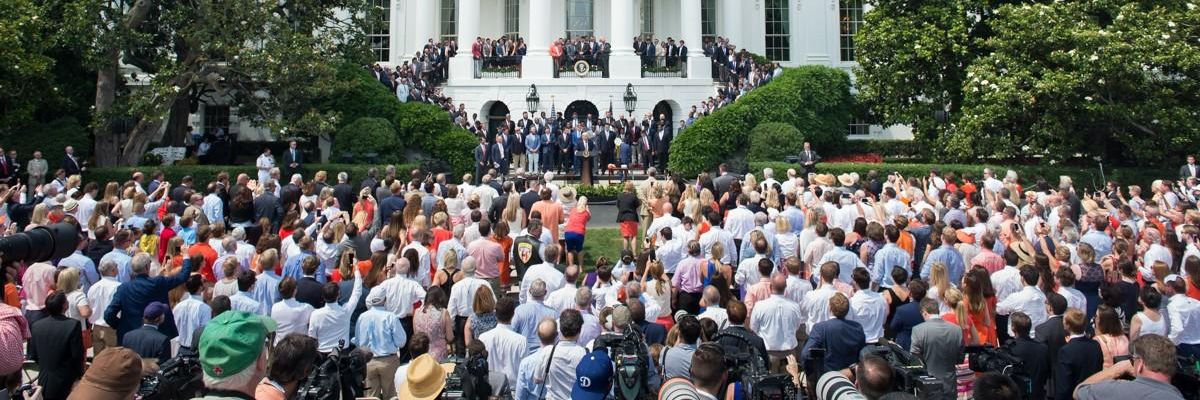One of the great ironies of the political moment is that President Trump's sworn enemy has become, if not exactly an ally, an enabler of his agenda. For all of Trump's griping about "fake news," the mainstream media's prevailing focus on palace intrigue and White House scandals has come at the expense of substantive policy coverage, allowing Trump and the Republican Party to advance harmful, hugely unpopular policies without the scrutiny they deserve.
Take climate change. This month, Trump officially announced the United States' withdrawal from the Paris climate accord, joining Syria and Nicaragua as the only countries to reject the landmark agreement. While Trump has espoused denialist views in the past, claiming that climate change is a Chinese hoax, his decision to withdraw was made more likely by the media's utter failure to press him on his position dating back to the campaign. Not only was there not a single question about the issue in last year's general election debates, but also the watchdog organization Fairness & Accuracy in Reporting (FAIR) recently noted that Trump has not been asked "a single question about climate change in any interview or press conference" since taking office. Twelve separate outlets that Trump has granted on-the-record interviews have simply failed to bring it up.
Or consider health care. Recent polls have identified health care as Americans' No. 1 concern, but it has not been treated that way in the media. Since the House's initial failure to pass a bill this spring, coverage of the issue has dwindled, with the exception of a brief spike when Republicans hastily pushed through a bill in May. Now, as Senate Majority Leader Mitch McConnell (R-Ky.) secretly maneuvers to gut the Affordable Care Act -- without holding hearings or releasing any legislative details to the public -- many in the mainstream media have responded with a collective yawn. Even as reports of McConnell's machinations emerged last week, The Post, the New York Times, the Wall Street Journal and the Los Angeles Times each determined, for two consecutive days, that the rising likelihood of a bill passing did not warrant a front-page story.
At the same time, the wall-to-wall coverage of Attorney General Jeff Sessions's bumbling testimony before the Senate Intelligence Committee was just the latest example of the media's myopic obsession with all things Russia. While the investigations into Trump's campaign and the president's possible obstruction of justice are clearly newsworthy, they have denied oxygen to other issues that have a far greater impact on Americans' daily lives. (On the day Sessions testified, Sen. Chris Murphy (D-Conn.) urged his Twitter followers to focus 90 percent of their attention on health care.) The fervor has also led to instances of overzealous reporting, including unsubstantiated claims of Russian hacking in France's presidential election in May.
These are just a few examples of the media malpractice that continues to corrode our political discourse. Others include the fawning coverage of Trump's unauthorized missile strikes in Syria, the virtual blackout on television of Republican steps to unravel Wall Street reforms, and the "cancer of false equivalence," as media columnist Eric Alterman of the Nation recently called it, that still infects the reporting of our most prestigious and influential news organizations. Indeed, it is the same blind worship at the altar of "balance" that leads to troubling and dubious decisions, such as CNN employing dishonest Trump mouthpiece Jeffrey Lord or NBC allowing Megyn Kelly to put conspiracy theorist Alex Jones on its airwaves.
As I have written in the past, one of the primary drivers of this behavior is simple. In a corporate media environment where ratings are prized above all else, the reality is that sensationalism and scandal play better -- and, therefore, pay better -- than substance. CNN Worldwide President Jeff Zucker recently admitted as much, saying, "2016 was the best year in the history of cable news, and 2017 is going to be even better. There is no evidence that the interest in [Trump] is waning in any way." Zucker's comment echoed CBS Chief Executive Les Moonves, who said last year that Trump's political ascent was "damn good for CBS" and bragged that "the money's rolling in."
And, of course, the corporate media could benefit from more than higher ratings under Trump; they also stand to gain from policies that give even more power to the massive conglomerates that already dominate the media ecosystem. As Lee Fang reported at the Intercept, that was Moonves's message to investors in February, when he said that he was "looking forward to not having as much regulation" and that Trump's appointment of Federal Communications Commission Chairman Ajit Pai would be "very beneficial to our business."
Trump may be waging a war on the media, but many of his enemies are still committing media malpractice as they did in 2016, when the extreme dearth of policy coverage helped propel Trump to the White House. Perhaps they simply learned the wrong lesson from the campaign: that keeping the American people shocked, rather than informed, is the easiest path to the ratings they crave. Either way, it's toxic to our democracy.



